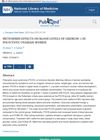Curcuma aeruginosa Roxb. may help treat hair loss by affecting specific biological pathways.
 July 2024 in “Research Square (Research Square)”
July 2024 in “Research Square (Research Square)” SIRT3 and SIRT7 decrease, while NFATC1 and PDL-1 increase in Androgenetic Alopecia.
 June 2024 in “Benha Journal of Applied Sciences”
June 2024 in “Benha Journal of Applied Sciences” β1 integrin may indicate and influence the severity of hair loss in androgenetic alopecia.
 May 2024 in “International Journal of Dermatology”
May 2024 in “International Journal of Dermatology” More research is needed to understand if GLP-1 agonists affect hair health.

A 9-year-old girl developed type 1 diabetes and alopecia after being treated for a rare kidney disease.

CaBP1 and CaBP2 are important for maintaining hearing by supporting continuous calcium currents and nerve signaling in the ear.
 December 2023 in “Paediatrics & Family Medicine/Pediatria & Medycyna Rodzinna”
December 2023 in “Paediatrics & Family Medicine/Pediatria & Medycyna Rodzinna” Type 1 diabetes patients often have other autoimmune diseases, which complicate their care.
 October 2023 in “Benha Journal of Applied Sciences”
October 2023 in “Benha Journal of Applied Sciences” Men with male pattern baldness have lower levels of the antioxidant PON1.
 September 2023 in “bioRxiv (Cold Spring Harbor Laboratory)”
September 2023 in “bioRxiv (Cold Spring Harbor Laboratory)” FOL-026 peptide can help repair blood vessels and promote growth, offering potential treatment for vascular diseases.
 August 2023 in “The journal of investigative dermatology/Journal of investigative dermatology”
August 2023 in “The journal of investigative dermatology/Journal of investigative dermatology” Longer immunotherapy treatment may improve outcomes for Merkel cell carcinoma patients.
 June 2023 in “Oriental Journal of Chemistry/Oriental journal of chemistry”
June 2023 in “Oriental Journal of Chemistry/Oriental journal of chemistry” New compounds may help treat prostate cancer by reducing cell growth.

Different androgen concentrations affect wool-related gene expression differently in Hetian and Karakul sheep breeds.

Sensory neuron and Merkel-cell changes in the skin happen independently during normal skin maintenance.
 May 2023 in “Journal of Pakistan Medical Association”
May 2023 in “Journal of Pakistan Medical Association” People with polycystic ovary syndrome have higher levels of Gremlin-1.
 April 2023 in “The journal of investigative dermatology/Journal of investigative dermatology”
April 2023 in “The journal of investigative dermatology/Journal of investigative dermatology” The study suggests that changes in immune system receptors and their interaction with a cell component may be important in the development of a type of hair loss condition.
 April 2023 in “Journal of Investigative Dermatology”
April 2023 in “Journal of Investigative Dermatology” Higher PD-1 levels are linked to fewer immune cells in hair follicles in alopecia areata.
 April 2023 in “Journal of Investigative Dermatology”
April 2023 in “Journal of Investigative Dermatology” Type 1/17 inflammation in psoriasis increases skin cell growth due to a molecule that could be a new treatment target.
 April 2023 in “Journal of The American Academy of Dermatology”
April 2023 in “Journal of The American Academy of Dermatology” Some drugs linked to growth hormones may increase the chance of hair loss in women.

Metformin lowers gremlin-1 and improves insulin resistance in women with PCOS.

Inhibiting AP-1 changes skin tumor types and affects tumor cell identity.

Inhibiting AP-1 changes skin tumor types and affects tumor cell identity.
 January 2023 in “Integrative Journal of Medical Sciences”
January 2023 in “Integrative Journal of Medical Sciences” A young Saudi girl with uncontrolled type 1 diabetes and hypothyroidism had two rare conditions, Mauriac syndrome and Van Wyk–Grumbach syndrome.
 January 2023 in “European journal of gynaecological oncology”
January 2023 in “European journal of gynaecological oncology” KRT17 may be a new target for endometrial cancer treatment because it helps cancer cells move and form new blood vessels.
 January 2023 in “Advances in reproductive sciences”
January 2023 in “Advances in reproductive sciences” Higher levels of the protein Pannexin-1 may play a role in hair loss in women with PCOS.

Water and fatty acids affect hair's surface differently based on hair damage, and models can help understand hair-cosmetic interactions.
 October 2022 in “Benha Journal of Applied Sciences”
October 2022 in “Benha Journal of Applied Sciences” Human Beta Defensin 1 levels do not predict the risk or severity of Alopecia Areata.
 October 2022 in “Benha Journal of Applied Sciences”
October 2022 in “Benha Journal of Applied Sciences” People with non-scarring hair loss have higher levels of DKK-1, a protein linked to hair growth, than those with scarring hair loss or no hair loss.
 October 2022 in “The Egyptian Journal of Hospital Medicine”
October 2022 in “The Egyptian Journal of Hospital Medicine” Females with idiopathic hirsutism have higher levels of omentin-1, which may lead to excessive hair growth.
 September 2022 in “bioRxiv (Cold Spring Harbor Laboratory)”
September 2022 in “bioRxiv (Cold Spring Harbor Laboratory)” Removing Mediator 1 causes teeth cells to turn into hair cells.
 July 2022 in “New Zealand journal of agricultural research”
July 2022 in “New Zealand journal of agricultural research” The KRTAP27-1 gene variations in sheep may affect wool length and weight.




























